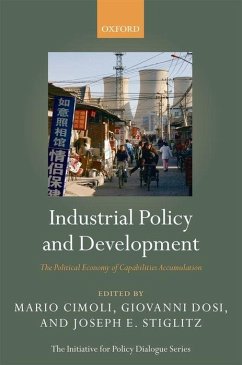Mario Cimoli / Giovanni Dosi / Joseph E. Stiglitz (Hrsg.)The Political Economy of Capabilities Accumulation
Industrial Policy and Development
The Political Economy of Capabilities Accumulation
Herausgeber: Dosi, Giovanni; Stiglitz, Joseph E; Cimoli, Mario
Mario Cimoli / Giovanni Dosi / Joseph E. Stiglitz (Hrsg.)The Political Economy of Capabilities Accumulation
Industrial Policy and Development
The Political Economy of Capabilities Accumulation
Herausgeber: Dosi, Giovanni; Stiglitz, Joseph E; Cimoli, Mario
- Gebundenes Buch
- Merkliste
- Auf die Merkliste
- Bewerten Bewerten
- Teilen
- Produkt teilen
- Produkterinnerung
- Produkterinnerung
In the 1990s, development policy advocated by international financial institutions was influenced by Washington Consensus thinking. This strategy, based largely on liberalization, privatization, and price-flexibility, downplayed, if not disregarded, the role of government in steering the processes of technological learning and economic growth. With the exception of the Far East, many developing countries adopted the view that industrial policy resulted in inefficiency and poor economic growth. Ample historical evidence shows that industrial policy does work, when the right technologies and…mehr
Andere Kunden interessierten sich auch für
![African Industrial Development and European Union Co-Operation African Industrial Development and European Union Co-Operation]() African Industrial Development and European Union Co-Operation217,99 €
African Industrial Development and European Union Co-Operation217,99 €![India: Economic Development and Social Opportunity India: Economic Development and Social Opportunity]() Jean DrezeIndia: Economic Development and Social Opportunity149,99 €
Jean DrezeIndia: Economic Development and Social Opportunity149,99 €![Globalization for Development Globalization for Development]() Ian GoldinGlobalization for Development204,99 €
Ian GoldinGlobalization for Development204,99 €![After-Development Dynamics After-Development Dynamics]() Anthony P D'CostaAfter-Development Dynamics174,99 €
Anthony P D'CostaAfter-Development Dynamics174,99 €![Food Price Policy in an Era of Market Instability Food Price Policy in an Era of Market Instability]() Per Pinstrup-AndersenFood Price Policy in an Era of Market Instability204,99 €
Per Pinstrup-AndersenFood Price Policy in an Era of Market Instability204,99 €![Economic Liberalization and Industrial Performance in Brazil Economic Liberalization and Industrial Performance in Brazil]() Edmund AmannEconomic Liberalization and Industrial Performance in Brazil98,99 €
Edmund AmannEconomic Liberalization and Industrial Performance in Brazil98,99 €![Role of Elites in Economic Development Role of Elites in Economic Development]() Alice H AmsdenRole of Elites in Economic Development198,99 €
Alice H AmsdenRole of Elites in Economic Development198,99 €-
-
-
In the 1990s, development policy advocated by international financial institutions was influenced by Washington Consensus thinking. This strategy, based largely on liberalization, privatization, and price-flexibility, downplayed, if not disregarded, the role of government in steering the processes of technological learning and economic growth. With the exception of the Far East, many developing countries adopted the view that industrial policy resulted in inefficiency and poor economic growth. Ample historical evidence shows that industrial policy does work, when the right technologies and industries are supported and when appropriate combinations of policy measures are implemented. This book provides an in-depth exploration of which industrial policies have been successful, the trade-offs associated with these microeconomic approaches to growth and development, and the opportunities and constraints associated with the current organization of international economic relations.
Hinweis: Dieser Artikel kann nur an eine deutsche Lieferadresse ausgeliefert werden.
Hinweis: Dieser Artikel kann nur an eine deutsche Lieferadresse ausgeliefert werden.
Produktdetails
- Produktdetails
- Verlag: Oxford University Press (UK)
- Seitenzahl: 596
- Erscheinungstermin: 30. November 2009
- Englisch
- Abmessung: 234mm x 156mm x 33mm
- Gewicht: 1007g
- ISBN-13: 9780199235261
- ISBN-10: 0199235260
- Artikelnr.: 26178868
- Herstellerkennzeichnung
- Libri GmbH
- Europaallee 1
- 36244 Bad Hersfeld
- gpsr@libri.de
- Verlag: Oxford University Press (UK)
- Seitenzahl: 596
- Erscheinungstermin: 30. November 2009
- Englisch
- Abmessung: 234mm x 156mm x 33mm
- Gewicht: 1007g
- ISBN-13: 9780199235261
- ISBN-10: 0199235260
- Artikelnr.: 26178868
- Herstellerkennzeichnung
- Libri GmbH
- Europaallee 1
- 36244 Bad Hersfeld
- gpsr@libri.de
M. Cimoli is Professor of Economics at the University of Venice (Ca' Foscari) since 1992 and Economic Affair Officer at ECLAC (Economic Commission for Latin America and the Caribbean) of UNITED NATIONS since 1999. He obtained a DPhil at the SPRU (University of Sussex) and he has held a number of visiting appointments in different universities and institutions (University of Pisa, University Metropolitan of Mexico (UAM), University of Campinas, etc). Giovanni Dosi is Professor of Economics at the Scuola Superiore Sant'Anna in Pisa and Visiting Professor at the University of Manchester. His major research areas include economics of innovation and technological change, industrial organisation and industrial dynamics, theory of the firm and corporate governance, economic growth and development. Professor Dosi is Co-Director of the task forces on Industrial Policy and Intellectual Property Rights at the Initiative for Policy Dialogue, Columbia University, New York; Continental Europen Editor of Industrial and Corporate Change, Research consultant for Italian and international public and private institutions, and Honorary Research Professor at the University of Sussex. Joseph E. Stiglitz was awarded the Nobel Prize in economics in 2001 and is University Professor at Columbia University where he founded the Initiative for Policy Dialogue in 2000. He was Chair of President Bill Clinton's Council of Economic Advisors from 1995-97 and Chief Economist and Senior Vice-President of the World Bank from 1997-2000. He is also chair of the University of Manchester's Brooks World Poverty Institute and is a member of the Pontifical Academy of Social Sciences. His best known recent publications include 'Making Globalization Work' (2006), 'Fair Trade for All' (2005), 'Globalization and its Discontents' (2002) and 'The Roaring Nineties' (2003).
* Preface
* 1: Mario Cimoli, Giovanni Dosi , Joseph E. Stiglitz: The Political
Economy of Capabilities Accumulation: The Past and Future of Policies
for Industrial Development
* General Introduction
* 2: Mario Cimoli, Giovanni Dosi, Richard R. Nelson, Joseph E.
Stiglitz: Institutions and Policies Shaping Industrial Development:
An Introductory Note
* 3: Carolina Castaldi, Mario Cimoli, Nelson Correa, Giovanni Dosi:
Technological Learning, Policy Regimes and Growth: The Long Term
Patterns and Some Specificities of a 'Globalized' Economy
* Industrial Policies in an historical perspective
* 4: Erik S. Reinert: Emulation v. Comparative Advantage: Competing and
Complementary Principles in the History of Economic Policy
* 5: Michele Di Maio: Industrial Policies in Developing Countries:
History and Perspectives
* 6: Yilmaz Akyuz: Industrial Tariffs, International Trade And
Development
* 7: Wilson Peres: The (Slow) Return of Industrial Policies in Latin
America and the Caribbean
* National and regional experiences
* 8: Jose Gabriel Palma: Flying Geese and Waddling Ducks: the Different
Capabilities of East Asia and Latin America to 'Demand-Adapt' and
'Supply-Upgrade' their Export Productive Capacity
* 9: Bernardo Kosakoff, Adrian Ramos: Microeconomic Evolution in High
Uncertainty Contexts: The Manufacturing Sector in Argentina
* 10: Antonio Barros de Castro: The Impact of Public Policies in Brazil
Along the Path from Semi-Stagnation to Growth in a Sino-Centric
Market
* 11: Ajit Singh: The Past, Present and Future of Industrial Policy in
India: Adapting to the Changing Domestic and International
Environment
* 12: Carl J. Dahlman: Growth and Development in China and India: The
Role of Industrial and Innovation Policy in Rapid Catch-up
* 13: Mushtaq H. Khan, Stephanie Blankenburg: The Political Economy of
Industrial Policy in Asia and Latin America
* 14: Roberto Mazzoleni, Richard R. Nelson: The Roles of Research at
Universities and Public Labs in Economic Catch-up
* 15: Alice H. Amsden: Nationality of Firm Ownership in Developing
Countries: Who Should Crowd Out Whom in Imperfect Markets?
* 16: Colin Mayer: A Question of Trust: Historical Lessons for Current
Development
* 17: Mario L. Possas, Heloisa L. Borges: Competition Policy and
Industrial Development
* 18: Mike Hobday, Fernando Afonso de Barros Perini: Latecomer
Entrepreneurship: a Policy Perspective
* 19: Mario Cimoli, Benjamin Coriat, Annalisa Primi: Intellectual
Property and Industrial Development: A Critical Assessment
* Conclusion
* 20: Mario Cimoli, Giovanni Dosi, Joseph E. Stiglitz: The Future of
Industrial Policies in the New Millennium: Toward a
Knowledge-centered Development Agenda
* 1: Mario Cimoli, Giovanni Dosi , Joseph E. Stiglitz: The Political
Economy of Capabilities Accumulation: The Past and Future of Policies
for Industrial Development
* General Introduction
* 2: Mario Cimoli, Giovanni Dosi, Richard R. Nelson, Joseph E.
Stiglitz: Institutions and Policies Shaping Industrial Development:
An Introductory Note
* 3: Carolina Castaldi, Mario Cimoli, Nelson Correa, Giovanni Dosi:
Technological Learning, Policy Regimes and Growth: The Long Term
Patterns and Some Specificities of a 'Globalized' Economy
* Industrial Policies in an historical perspective
* 4: Erik S. Reinert: Emulation v. Comparative Advantage: Competing and
Complementary Principles in the History of Economic Policy
* 5: Michele Di Maio: Industrial Policies in Developing Countries:
History and Perspectives
* 6: Yilmaz Akyuz: Industrial Tariffs, International Trade And
Development
* 7: Wilson Peres: The (Slow) Return of Industrial Policies in Latin
America and the Caribbean
* National and regional experiences
* 8: Jose Gabriel Palma: Flying Geese and Waddling Ducks: the Different
Capabilities of East Asia and Latin America to 'Demand-Adapt' and
'Supply-Upgrade' their Export Productive Capacity
* 9: Bernardo Kosakoff, Adrian Ramos: Microeconomic Evolution in High
Uncertainty Contexts: The Manufacturing Sector in Argentina
* 10: Antonio Barros de Castro: The Impact of Public Policies in Brazil
Along the Path from Semi-Stagnation to Growth in a Sino-Centric
Market
* 11: Ajit Singh: The Past, Present and Future of Industrial Policy in
India: Adapting to the Changing Domestic and International
Environment
* 12: Carl J. Dahlman: Growth and Development in China and India: The
Role of Industrial and Innovation Policy in Rapid Catch-up
* 13: Mushtaq H. Khan, Stephanie Blankenburg: The Political Economy of
Industrial Policy in Asia and Latin America
* 14: Roberto Mazzoleni, Richard R. Nelson: The Roles of Research at
Universities and Public Labs in Economic Catch-up
* 15: Alice H. Amsden: Nationality of Firm Ownership in Developing
Countries: Who Should Crowd Out Whom in Imperfect Markets?
* 16: Colin Mayer: A Question of Trust: Historical Lessons for Current
Development
* 17: Mario L. Possas, Heloisa L. Borges: Competition Policy and
Industrial Development
* 18: Mike Hobday, Fernando Afonso de Barros Perini: Latecomer
Entrepreneurship: a Policy Perspective
* 19: Mario Cimoli, Benjamin Coriat, Annalisa Primi: Intellectual
Property and Industrial Development: A Critical Assessment
* Conclusion
* 20: Mario Cimoli, Giovanni Dosi, Joseph E. Stiglitz: The Future of
Industrial Policies in the New Millennium: Toward a
Knowledge-centered Development Agenda
* Preface
* 1: Mario Cimoli, Giovanni Dosi , Joseph E. Stiglitz: The Political
Economy of Capabilities Accumulation: The Past and Future of Policies
for Industrial Development
* General Introduction
* 2: Mario Cimoli, Giovanni Dosi, Richard R. Nelson, Joseph E.
Stiglitz: Institutions and Policies Shaping Industrial Development:
An Introductory Note
* 3: Carolina Castaldi, Mario Cimoli, Nelson Correa, Giovanni Dosi:
Technological Learning, Policy Regimes and Growth: The Long Term
Patterns and Some Specificities of a 'Globalized' Economy
* Industrial Policies in an historical perspective
* 4: Erik S. Reinert: Emulation v. Comparative Advantage: Competing and
Complementary Principles in the History of Economic Policy
* 5: Michele Di Maio: Industrial Policies in Developing Countries:
History and Perspectives
* 6: Yilmaz Akyuz: Industrial Tariffs, International Trade And
Development
* 7: Wilson Peres: The (Slow) Return of Industrial Policies in Latin
America and the Caribbean
* National and regional experiences
* 8: Jose Gabriel Palma: Flying Geese and Waddling Ducks: the Different
Capabilities of East Asia and Latin America to 'Demand-Adapt' and
'Supply-Upgrade' their Export Productive Capacity
* 9: Bernardo Kosakoff, Adrian Ramos: Microeconomic Evolution in High
Uncertainty Contexts: The Manufacturing Sector in Argentina
* 10: Antonio Barros de Castro: The Impact of Public Policies in Brazil
Along the Path from Semi-Stagnation to Growth in a Sino-Centric
Market
* 11: Ajit Singh: The Past, Present and Future of Industrial Policy in
India: Adapting to the Changing Domestic and International
Environment
* 12: Carl J. Dahlman: Growth and Development in China and India: The
Role of Industrial and Innovation Policy in Rapid Catch-up
* 13: Mushtaq H. Khan, Stephanie Blankenburg: The Political Economy of
Industrial Policy in Asia and Latin America
* 14: Roberto Mazzoleni, Richard R. Nelson: The Roles of Research at
Universities and Public Labs in Economic Catch-up
* 15: Alice H. Amsden: Nationality of Firm Ownership in Developing
Countries: Who Should Crowd Out Whom in Imperfect Markets?
* 16: Colin Mayer: A Question of Trust: Historical Lessons for Current
Development
* 17: Mario L. Possas, Heloisa L. Borges: Competition Policy and
Industrial Development
* 18: Mike Hobday, Fernando Afonso de Barros Perini: Latecomer
Entrepreneurship: a Policy Perspective
* 19: Mario Cimoli, Benjamin Coriat, Annalisa Primi: Intellectual
Property and Industrial Development: A Critical Assessment
* Conclusion
* 20: Mario Cimoli, Giovanni Dosi, Joseph E. Stiglitz: The Future of
Industrial Policies in the New Millennium: Toward a
Knowledge-centered Development Agenda
* 1: Mario Cimoli, Giovanni Dosi , Joseph E. Stiglitz: The Political
Economy of Capabilities Accumulation: The Past and Future of Policies
for Industrial Development
* General Introduction
* 2: Mario Cimoli, Giovanni Dosi, Richard R. Nelson, Joseph E.
Stiglitz: Institutions and Policies Shaping Industrial Development:
An Introductory Note
* 3: Carolina Castaldi, Mario Cimoli, Nelson Correa, Giovanni Dosi:
Technological Learning, Policy Regimes and Growth: The Long Term
Patterns and Some Specificities of a 'Globalized' Economy
* Industrial Policies in an historical perspective
* 4: Erik S. Reinert: Emulation v. Comparative Advantage: Competing and
Complementary Principles in the History of Economic Policy
* 5: Michele Di Maio: Industrial Policies in Developing Countries:
History and Perspectives
* 6: Yilmaz Akyuz: Industrial Tariffs, International Trade And
Development
* 7: Wilson Peres: The (Slow) Return of Industrial Policies in Latin
America and the Caribbean
* National and regional experiences
* 8: Jose Gabriel Palma: Flying Geese and Waddling Ducks: the Different
Capabilities of East Asia and Latin America to 'Demand-Adapt' and
'Supply-Upgrade' their Export Productive Capacity
* 9: Bernardo Kosakoff, Adrian Ramos: Microeconomic Evolution in High
Uncertainty Contexts: The Manufacturing Sector in Argentina
* 10: Antonio Barros de Castro: The Impact of Public Policies in Brazil
Along the Path from Semi-Stagnation to Growth in a Sino-Centric
Market
* 11: Ajit Singh: The Past, Present and Future of Industrial Policy in
India: Adapting to the Changing Domestic and International
Environment
* 12: Carl J. Dahlman: Growth and Development in China and India: The
Role of Industrial and Innovation Policy in Rapid Catch-up
* 13: Mushtaq H. Khan, Stephanie Blankenburg: The Political Economy of
Industrial Policy in Asia and Latin America
* 14: Roberto Mazzoleni, Richard R. Nelson: The Roles of Research at
Universities and Public Labs in Economic Catch-up
* 15: Alice H. Amsden: Nationality of Firm Ownership in Developing
Countries: Who Should Crowd Out Whom in Imperfect Markets?
* 16: Colin Mayer: A Question of Trust: Historical Lessons for Current
Development
* 17: Mario L. Possas, Heloisa L. Borges: Competition Policy and
Industrial Development
* 18: Mike Hobday, Fernando Afonso de Barros Perini: Latecomer
Entrepreneurship: a Policy Perspective
* 19: Mario Cimoli, Benjamin Coriat, Annalisa Primi: Intellectual
Property and Industrial Development: A Critical Assessment
* Conclusion
* 20: Mario Cimoli, Giovanni Dosi, Joseph E. Stiglitz: The Future of
Industrial Policies in the New Millennium: Toward a
Knowledge-centered Development Agenda








